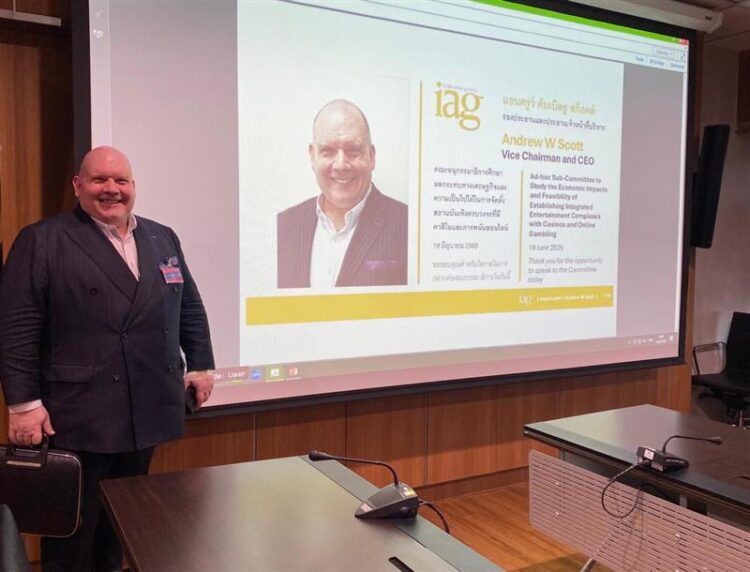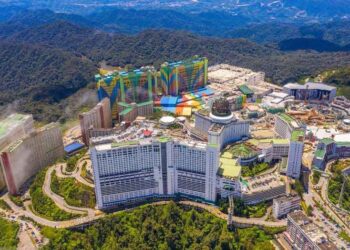Inside Asian Gaming’s Vice Chairman and CEO, Andrew W Scott, spoke yesterday at a hearing of Thailand’s ad hoc subcommittee studying the economic impacts and feasibility of establishing entertainment complexes (ECs) with casinos and online gaming, at the Thai Parliament in Bangkok.
The subcommittee is part of a larger 34-member special senate committee currently conducting a detailed 180-day study of Thailand’s Entertainment Complex Bill.
Andrew’s presentation was designed to provide the subcommittee with insights into how the bill compares with global industry best practices – particularly highlighting the key factors foreign investors will consider if they are to enter the Thai market.
He was specifically asked by the subcommittee to address four key issues:
-
An analysis of the opportunities, factors, concepts, and motivations of potential investors
-
His opinion on the laws and regulations as currently drafted
-
His assessment of the image, confidence, and risks associated with investing in ECs in Thailand
-
Any other relevant matters, including a summary of findings from the recent Thailand Entertainment Complex Roundtable (TECR) held in Bangkok on 5 June
It was emphasized at the outset that the decision on whether to proceed with ECs lies solely with Thailand. The presentation was not intended to influence the subcommittee’s decision but rather to ensure that any decisions are well-informed.
Andrew noted that ECs are very complex businesses, with counterintuitive effects on a society. He noted that deep understanding of ECs is a niche area of knowledge, that the Thai public currently has little frame of reference with which to assess ECs, and that the discussions around their introduction often evoke irrational and emotive responses rather than thoughtful or considered ones.
He provided a detailed explanation of what an EC entails, stressing that an EC is not a casino. Among the opportunities for investors, he cited Bangkok’s large population base with unmet demand, the high gambling propensity among Thais, Thailand’s globally renowned food and culture, its strong tourism infrastructure, and Bangkok’s advantageous location as a Southeast Asian hub.
Andrew outlined 20 factors that EC investors would consider before making a commitment. The top five were:
-
Gross Gaming Revenue (GGR) tax rate and other charges
-
The extent of exclusivity (both geographically and in time)
-
The presence of the THB50 million (US$1.5 million) minimum bank balance requirement – which he identified as an absolute deal breaker if retained
-
Whether Public-Private Partnerships (PPPs) would be required in any way
-
The length of licenses – already determined as 30 years initially, followed by 10-year renewals
While the subcommittee sought his opinion on concepts, Andrew explained it was too early to present specific concepts. However, he noted that ECs in Thailand would likely reflect a blend of operators’ existing offerings with distinct Thai elements such as Muay Thai and OTOP (One Tambon One Product).
Commenting on the current draft of the Entertainment Complex Bill, Andrew said certain clauses would benefit from reconsideration, including the THB50 million requirement and a provision naming the Prime Minister as chair of the policy committee. He recommended that the regulatory body be independent — to ensure proper oversight, to protect the industry from the vagaries of political cycles and to protect the Prime Minister from potential litigation.
He also praised the committee for much of the bill’s content, noting he had personally reviewed the draft in minute detail.
Andrew identified 10 key unanswered questions that investors will seek clarity on:
-
The final GGR tax rate
-
The number of ECs to be developed
-
The extent of exclusivity for each EC
-
The ultimate decision regarding the THB50 million requirement, noting its retention in its current form would be seen as an absolute deal breaker
-
Any equity structure requirements to partner with local entities
-
Minimum investment requirements and likely actual investment levels
-
Land location and leasing regulations
-
The independence of the regulator
-
Whether online gaming will be permitted (either now or later) for licensed land-based operators
-
Whether online gaming will be permitted (either now or later) for new market entrants.
He emphasized that entry into the Thailand market presents political, social, legal, reputational, and regulatory risks, and investors will need to be assured that returns justify those risks.
Andrew’s presentation follows the successful TECR event earlier this month, which for the first time brought together influential voices from both sides of the EC debate in a respectful and informative discussion.
TECR aimed to promote a fact-based narrative and, with around 40 members of the Thai media in attendance, has since generated dozens of articles across mainstream Thai outlets, providing the public with valuable insights into the realities of entertainment complexes.































